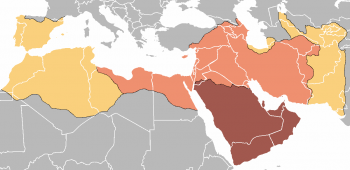Islamic history – the Umayyad Caliphate Posted by aziza on Mar 23, 2009
The Umayyad Dynasty (الخلافةالأموية) is the second dynasty to rule the Islamic empire. The capital of the Umayyad caliphate was Damascus, and during the Umayyad rule, the Islamic state extended to include new territories in Asia, Africa, as well as Andalucía in Spain and Portugal. The Umayyad Caliphate (الخلافةالأموية) began 6 months after the death…
The Past (Perfect) Tense in Arabic Posted by aziza on Mar 23, 2009
In Arabic, the past time frame is used to mark actions that are complete at the time of speaking or writing. It is mainly marked by suffixes at the end of verbs that depend on the person or pronoun used. Examples of the past (perfect) tense: درس اللغة العربية. “He studied Arabic.” سكنتَ…
Five Letters To My Mother Posted by aziza on Mar 16, 2009
“ خمس رسائل إلى أميFive Letters To My Mother” is a beautiful poem from Nizar Qabbani. Five Letters To My Mother خمس رسائل إلى أمي Good morning sweetheart. Good morning My beautiful Saint It has been two years, mother since the boy has sailed on his legendary journey. Since hid within his luggage the…
Nizar Qabbani Posted by aziza on Mar 11, 2009
Nizar Qabbani (نزار قباني)is a famous Arab poet, who is very well known for his romantic and feminist poetry. He was born in Damascus on 21 March 1923. Nizar was born to a middle class family, and his father owned a sweets shop. He liked arts, particularly drawing and music in his childhood, but later…
The Present (Imperfect) Tense in Arabic Posted by aziza on Mar 9, 2009
In Arabic, the time of the verb is marked by prefixes and suffixes that differ from present (imperfect) and past (perfect). The present or imperfect is used with actions that are still in progress or with repeated actions, e.g. things that you do everyday or usually, etc. Examples of the imperfect tense: أدرس اللغة…
Family Vocabulary in Arabic Posted by aziza on Mar 8, 2009
Terms used to express family relations in Arabic are more explicit than in English. This may reflect the importance of family and relations in the Arabic society. An example of the more explicit family relations terms in Arabic is that the term ‘uncle’ in English has 2 Arabic terms distinguishing ‘maternal uncle’ (خال) and ‘paternal…
Relative and demonstrative pronouns in Arabic Posted by aziza on Mar 5, 2009
Relative pronouns, like ‘who’, ‘which’, ‘whose’, ‘what’, etc. are used at the beginning of relative clauses to describe a definite noun. In Arabic, relative pronouns come after definite nouns to introduce sentences that describe these nouns or provide additional information about them. Relative clauses that follow relative pronouns can be nominal or verbal sentences, e.g…



